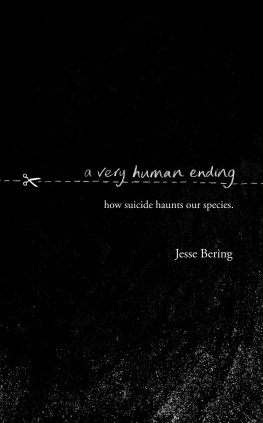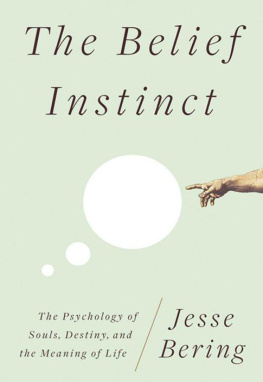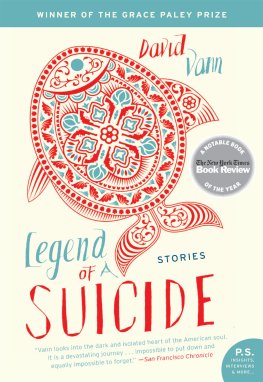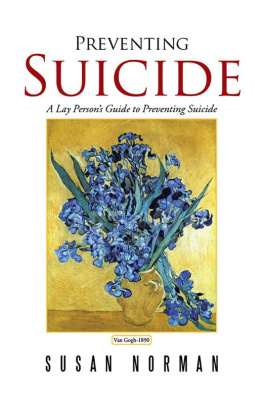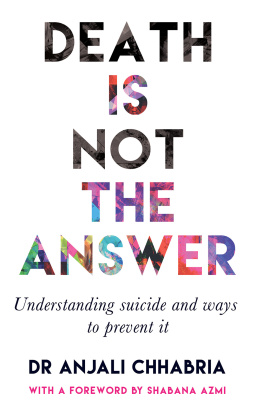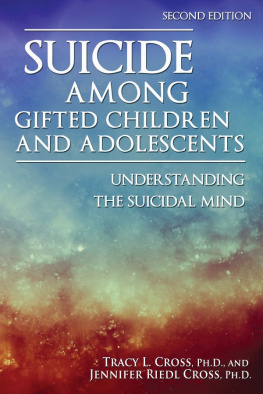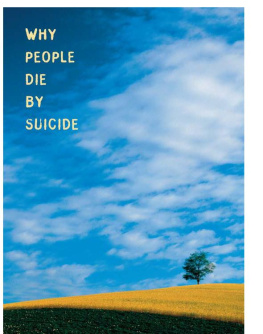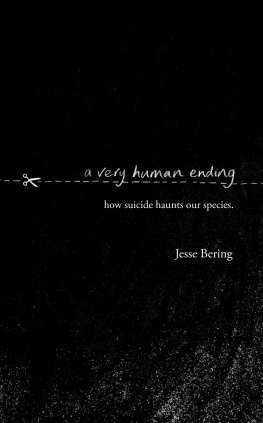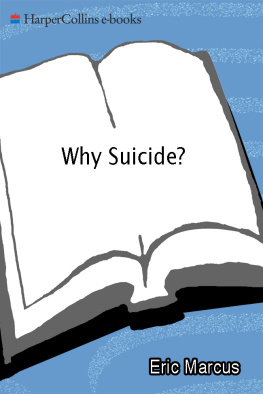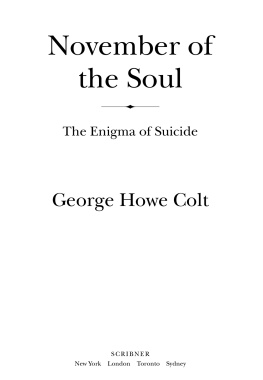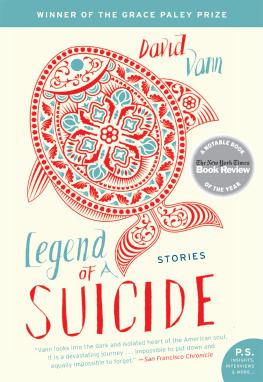Contents
about the author
Jesse Bering is an award-winning science writer specializing in evolutionary psychology and human behavior. A developmental psychologist by training, Bering is a renowned expert in the field of cognitive science and religion. He began his career at the University of Arkansas, as an Assistant Professor of Psychology from 2002 to 2006. He then served as the Director of the Institute of Cognition and Culture at Queens University Belfast until 2011. Presently, he is Director of the Centre for Science Communication at the University of Otago, New Zealand.
about the book
Why do people want to kill themselves? Despite the prevalence of suicide in the developed world, its a question most of us fail to ask. On hearing news of a suicide we are devastated, but overwhelmingly we feel disbelief. We distance ourselves with assurances that its the final act of a mentally ill other.
In an attempt to answer this and other di cult questions, in A Very Human Ending research psychologist Jesse Bering lifts the lid on this taboo subject, examining the suicidal mindset from the inside out to reveal the subtle tricks the mind can play when were easy emotional prey. In raising challenging questions Bering tests our contradictory superstitions about the act itself. He posits that these dark feelings are inherently social in nature, and that in the vast majority of cases it is negative social evaluations, real or imagined, which lead someone to take their own life.
Combining cutting-edge research with investigative journalism and first-person testimony, Bering also addresses the history of suicide and its evolutionary inheritance to offer a personal, accessible, yet scientifically sound examination of why we are the only species on earth that deliberately ends its own life.
This penetrating analysis aims to demystify a perennial subject that knows no cultural or demographic boundaries.
acknowledgments
This book began in angst. The irony is that my idea to write a book about suicide first came about while I was having suicidal feelings, which were there in no small part because Id run out of ideas for my next book. More precisely, Id run out of money. Anyway, whats that old saying? Luck is what happens when preparation meets opportunity. Thats pretty much how I got here. Luck, in this case, meant getting the chance to write this book instead of killing myself. I was prepared and had plenty of opportunities to do things the other way around toobecause dont forget, these two factors are catalysts not just for luck, but also suicide. But Im glad it worked out this way. What more can I say? Life is fickle.
I dont mean to sound grim. Its just the topic. The truth is, I greatly enjoyed working on this book. It wasto use that overused termcathartic. Also, sometimes, when you force yourself to think about unpleasant things, day and night, and in an academic sense, a strange beauty begins to reveal itself in their intricacies. Thats not to romanticize something so terrible as suicide; for those left in its wake, it is devastating. Rather, I mean only to say that there is order in the chaos, and when you begin to understand the intricate clockwork of suicidewhen you know what makes a human being tick in this fashionyoull never quite look at it the same way again. Thats a good thing; a shift in perspective can be life altering.
Many people helped get this book out of my head and into your hands. At the top of the list is Peter Tallack, my agent at the Science Factory, who was patient enough to see the proposal through to fruition. Alongside him was Tisse Takagi, who helped shape the scope of this work. The hardworking group at the University of Chicago Press has been enormously supportive of this project from its inception. Im especially grateful to Garrett Kiely for seeing the potential value of this undertaking, Christie Henry for giving it wings with early editorial work, and Priya Nelson, who bravely took over as editor and was instrumental in helping me to develop the manuscript. Levi Stahl did the marketing with gusto, Erin DeWitt was a marvel with copyediting, and Dylan Montanari did the legwork with getting the final bits and pieces in order. Im also indebted to two anonymous reviewers who offered detailed comments on an earlier draft. And in the UK, Doug Young and his fantastic team at Transworld were similarly with me from the start; I am very fortunate to have also had their unwavering support. This work was also made possible through a generous Prestigious Writing Grant from my employer, the University of Otago.
For those researchers, advocates, and other professionals who granted me interviews or responded to my emails about their important work, thank you. To name a key handful: Denys DeCatanzaro, Roy Baumeister, Carrie Jurney, David Chalmers, and Joe Nidd. Thanks also to the religious leaders who participated in my roundtable discussion about suicide. Bonnie Scarth, my tireless PhD student, provided encouragement and healing conversation during the writing of this book, and those who volunteered their private experiences and insight through Bonnies interview sessions for her doctoral thesis added greatly to this book.
Numerous friends and colleagues read and gave me feedback on various portions from early incarnations of this book. My sincere thanks goes out to Jenny Rock, Todd Shackelford, Lloyd Spencer Davis, Sue Harvey, Nancy Longnecker, Fabien Medvecky, Ross Johnston, Mary Roach, Jamin Halberstadt, Harvey Whitehouse, Emma Curtin, and Christopher Ryan. Also Nikki Saadat, who provided early assistance with the literature review. My students at the Centre for Science Communicationnamely, Michelle Walsh, Emma Harcourt, Elise Provis, Vibhuti Patel, and Conor Feehlyhelped me to stay the course with their inquisitiveness and conversations along the way. With perpetual gratitude, I thank my partner, Juan Quiles. Its not easy living with someone who is writing a book about suicide for eighteen months straight. Its out of my system now, I promise.
Most of all, I am indebted to those who had the courage and candor to share their personal stories about the loss of their loved ones to suicide. Thank you for your faith and trust in me. I will forever be in awe of your strength and clear wisdom in the face of such immeasurable grief.
the call to oblivion
Just as life had been strange a few minutes before, so death was now as strange. The moth having righted himself now lay most decently and uncomplainingly composed. O yes, he seemed to say, death is stronger than I am.
Virginia Woolf, The Death of the Moth (1942)
Just behind my former home in upstate New York, in a small, dense pocket of woods, stood an imposing lichen-covered oak tree built by a century of sun and dampness and frost, its hardened veins crisscrossing on the forest floor. It was just one of many such specimens in this copse of dappled shadows, birds, and well-worn deer tracks, but this particular tree held out a single giant limb crooked as an elbow, a branch so deliberately poised that whenever Id stroll past it while out with the dogs on our morning walks, it beckoned me.
It was the perfect place, I thought, to hang myself.
Id had fleeting suicidal feelings since my late teenage years. But now I was being haunted day and night by what was, in fact, a not altogether displeasing image of my corpse spinning ever so slowly from a rope tied around this creaking, pain-relieving branch. Its an absurd thoughtthat I could have observed my own dead body as if Id casually stumbled upon it. And what good would my death serve if it meant having to view it through the eyes of the very same head that I so desperately wanted to escape from in the first place?
Nonetheless, I couldnt help but fixate on this hypothetical scene of the lifeless, pirouetting dummy, this discarded sad sack whose long-suffering owner had been liberated from a world in which he didnt truly belong.

